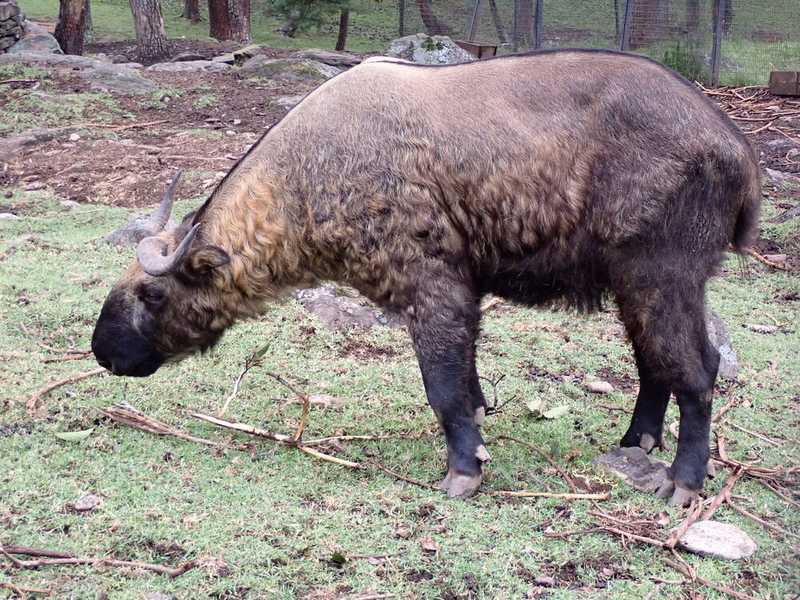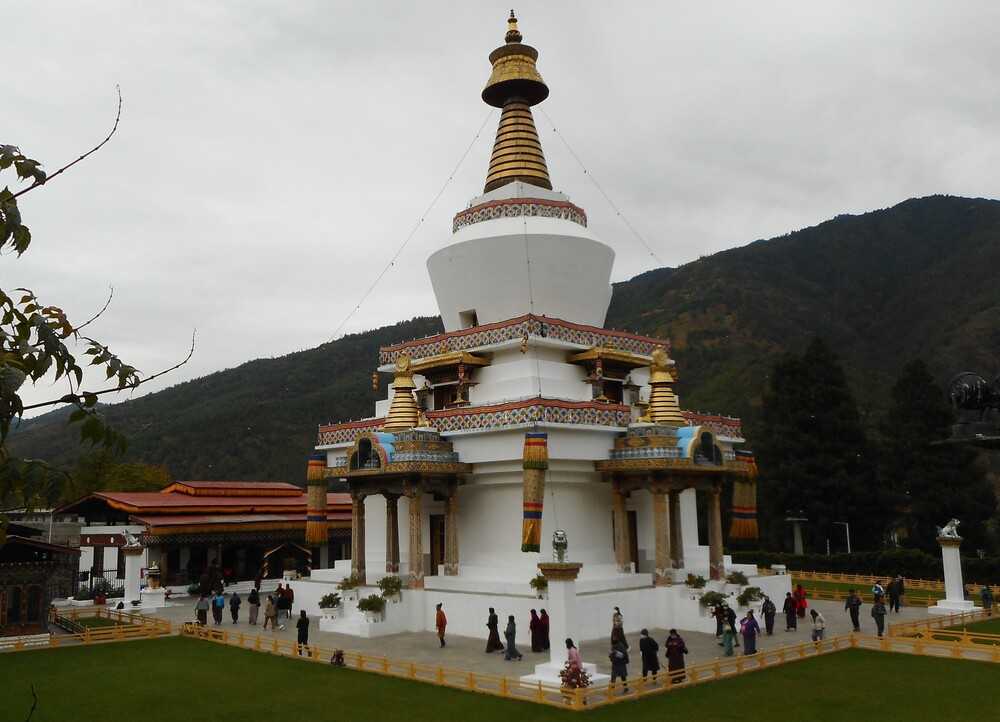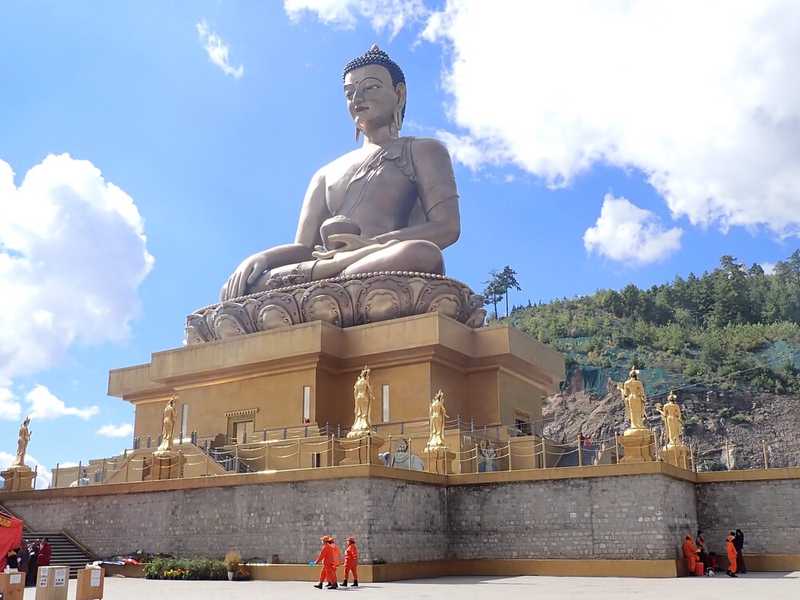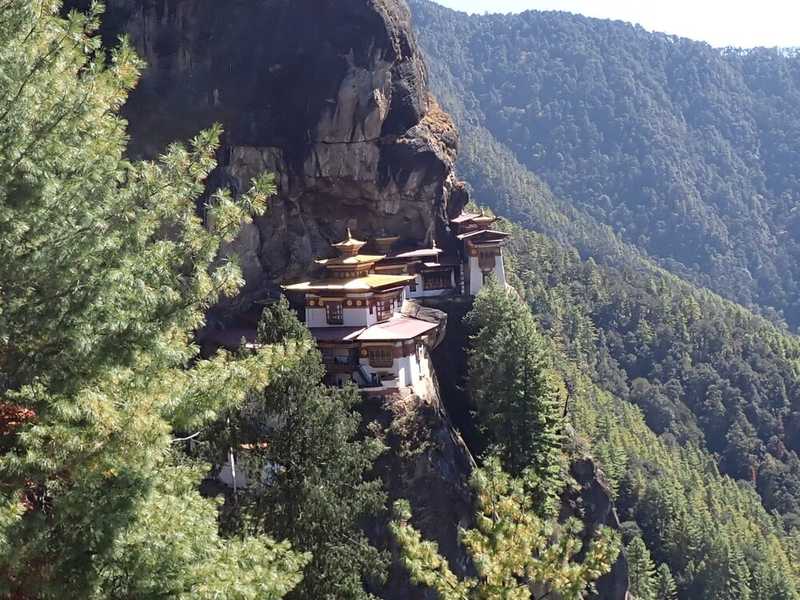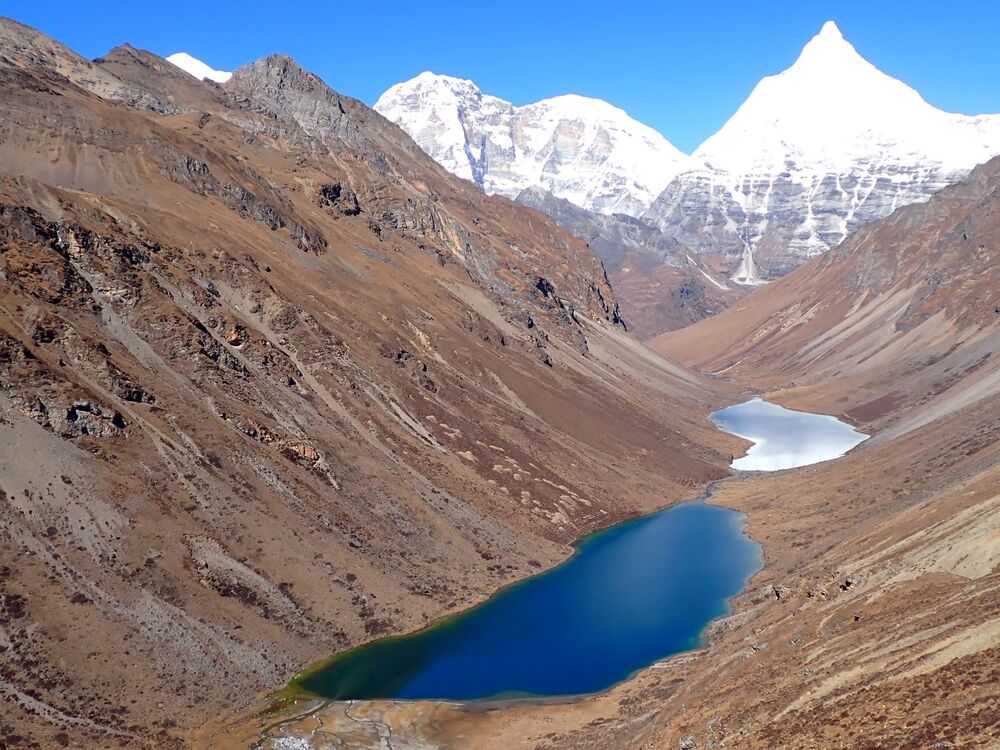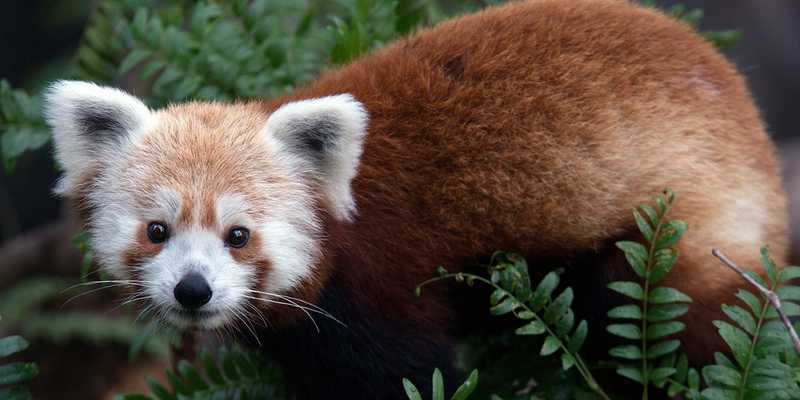Bhutan - BT - BTN - BHU - South Asia
Last updated: January 21, 2026
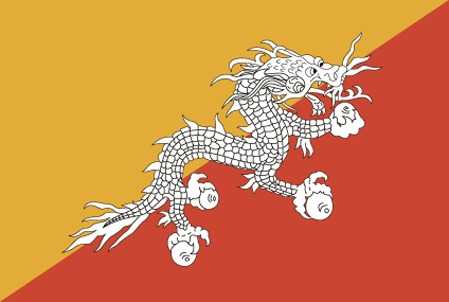
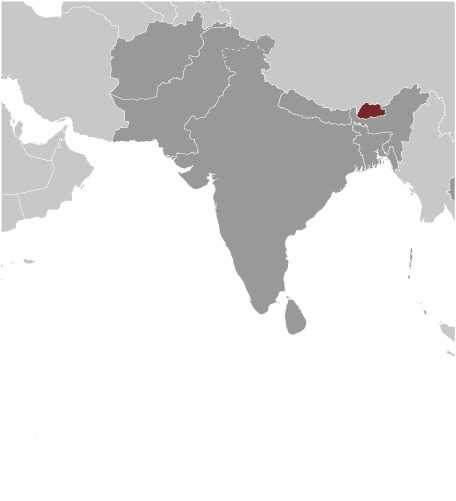
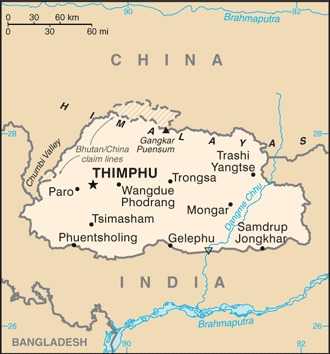
Bhutan Images
Bhutan Factbook Data
Diplomatic representation from the US
note: Although Bhutan and the United States have never established formal diplomatic relations, the two countries maintain informal relations via the U.S. Embassy in New Delhi, India, and Bhutan’s Mission to the United Nations in New York
Age structure
0-14 years: 23.1% (male 104,771/female 99,981)
15-64 years: 70.2% (male 322,497/female 298,324)
65 years and over: 6.7% (2024 est.) (male 30,397/female 28,576)
15-64 years: 70.2% (male 322,497/female 298,324)
65 years and over: 6.7% (2024 est.) (male 30,397/female 28,576)
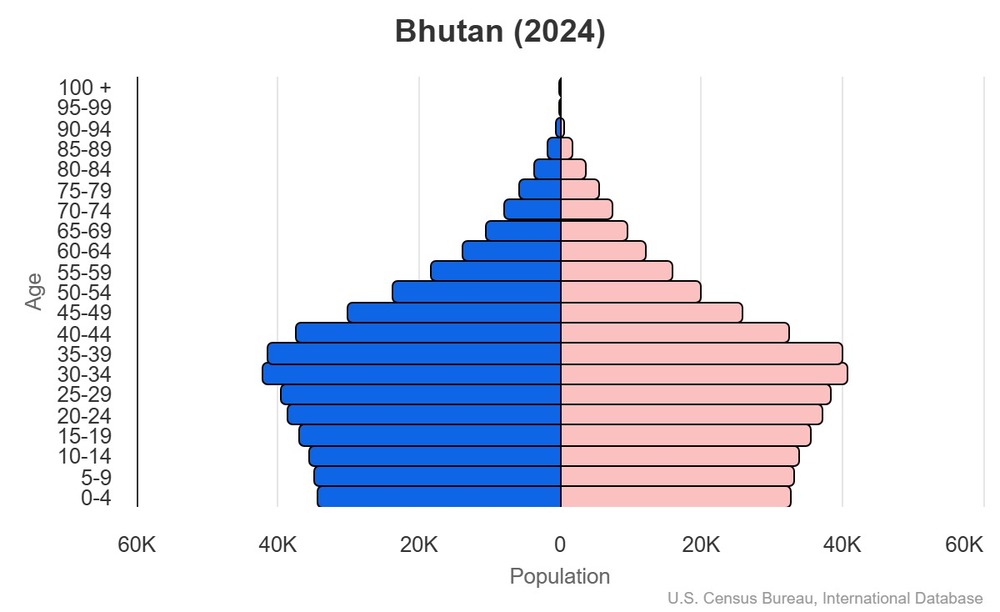
This is the population pyramid for Bhutan. A population pyramid illustrates the age and sex structure of a country's population and may provide insights about political and social stability, as well as economic development. The population is distributed along the horizontal axis, with males shown on the left and females on the right. The male and female populations are broken down into 5-year age groups represented as horizontal bars along the vertical axis, with the youngest age groups at the bottom and the oldest at the top. The shape of the population pyramid gradually evolves over time based on fertility, mortality, and international migration trends.
For additional information, please see the entry for Population pyramid on the Definitions and Notes page.
For additional information, please see the entry for Population pyramid on the Definitions and Notes page.
Geographic coordinates
27 30 N, 90 30 E
Sex ratio
at birth: 1.05 male(s)/female
0-14 years: 1.05 male(s)/female
15-64 years: 1.08 male(s)/female
65 years and over: 1.06 male(s)/female
total population: 1.07 male(s)/female (2024 est.)
0-14 years: 1.05 male(s)/female
15-64 years: 1.08 male(s)/female
65 years and over: 1.06 male(s)/female
total population: 1.07 male(s)/female (2024 est.)
Natural hazards
violent storms from the Himalayas are the source of the country's Bhutanese name, which translates as Land of the Thunder Dragon; frequent landslides during the rainy season
Area - comparative
slightly larger than Maryland; about one-half the size of Indiana
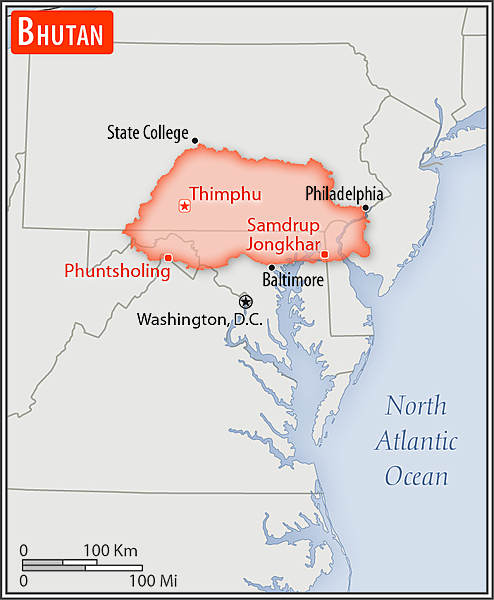
slightly larger than Maryland; about one-half the size of Indiana
Military service age and obligation
18 years of age for voluntary military service for men and women; militia training is compulsory for men aged 20-25 over a 3-year period (2025)
Background
After Britain’s victory in the 1865 Duar War, Britain and Bhutan signed the Treaty of Sinchulu, under which Bhutan would receive an annual subsidy in exchange for ceding land to British India. Ugyen WANGCHUCK -- who had served as the de facto ruler of an increasingly unified Bhutan and had improved relations with the British toward the end of the 19th century -- was named king in 1907. Three years later, a treaty was signed whereby the British agreed not to interfere in Bhutanese internal affairs, and Bhutan allowed Britain to direct its foreign affairs. Bhutan negotiated a similar arrangement with independent India in 1949. The Indo-Bhutanese Treaty of Friendship returned to Bhutan a small piece of the territory annexed by the British, formalized the annual subsidies the country received, and defined India's responsibilities in defense and foreign relations. Under a succession of modernizing monarchs beginning in the 1950s, Bhutan joined the UN in 1971 and slowly continued its engagement beyond its borders.
In 2005, King Jigme Singye WANGCHUCK unveiled the draft of Bhutan's first constitution -- which introduced major democratic reforms -- and held a national referendum for its approval. The King abdicated the throne in 2006 in favor of his son, Jigme Khesar Namgyel WANGCHUCK. In 2007, India and Bhutan renegotiated their treaty, eliminating the clause that stated that Bhutan would be "guided by" India in conducting its foreign policy, although Thimphu continues to coordinate closely with New Delhi. In 2008, Bhutan held its first parliamentary election in accordance with the constitution. Bhutan experienced a peaceful turnover of power following a parliamentary election in 2013, which resulted in the defeat of the incumbent party. In 2018, the incumbent party again lost the parliamentary election. In 2024, of the more than 100,000 ethnic Nepali -- predominantly Lhotshampa -- refugees who fled or were forced out of Bhutan in the 1990s, about 6,500 remain displaced in Nepal.
In 2005, King Jigme Singye WANGCHUCK unveiled the draft of Bhutan's first constitution -- which introduced major democratic reforms -- and held a national referendum for its approval. The King abdicated the throne in 2006 in favor of his son, Jigme Khesar Namgyel WANGCHUCK. In 2007, India and Bhutan renegotiated their treaty, eliminating the clause that stated that Bhutan would be "guided by" India in conducting its foreign policy, although Thimphu continues to coordinate closely with New Delhi. In 2008, Bhutan held its first parliamentary election in accordance with the constitution. Bhutan experienced a peaceful turnover of power following a parliamentary election in 2013, which resulted in the defeat of the incumbent party. In 2018, the incumbent party again lost the parliamentary election. In 2024, of the more than 100,000 ethnic Nepali -- predominantly Lhotshampa -- refugees who fled or were forced out of Bhutan in the 1990s, about 6,500 remain displaced in Nepal.
Environmental issues
soil erosion; limited access to potable water; wildlife conservation; industrial pollution; waste disposal
International environmental agreements
party to: Biodiversity, Climate Change, Climate Change-Kyoto Protocol, Climate Change-Paris Agreement, Desertification, Endangered Species, Hazardous Wastes, Nuclear Test Ban, Ozone Layer Protection, Wetlands
signed, but not ratified: Law of the Sea
signed, but not ratified: Law of the Sea
Population below poverty line
12.4% (2022 est.)
note: % of population with income below national poverty line
note: % of population with income below national poverty line
Household income or consumption by percentage share
lowest 10%: 3.6% (2022 est.)
highest 10%: 22.7% (2022 est.)
note: % share of income accruing to lowest and highest 10% of population
highest 10%: 22.7% (2022 est.)
note: % share of income accruing to lowest and highest 10% of population
Exports - commodities
iron alloys, aircraft, dolomite, semi-finished iron, cement (2023)
note: top five export commodities based on value in dollars
note: top five export commodities based on value in dollars
Exports - partners
India 92%, Italy 4%, Indonesia 1%, China 1%, Singapore 0% (2023)
note: top five export partners based on percentage share of exports
note: top five export partners based on percentage share of exports
Administrative divisions
20 districts (dzongkhag, singular and plural); Bumthang, Chhukha, Dagana, Gasa, Haa, Lhuentse, Mongar, Paro, Pemagatshel, Punakha, Samdrup Jongkhar, Samtse, Sarpang, Thimphu, Trashigang, Trashi Yangtse, Trongsa, Tsirang, Wangdue Phodrang, Zhemgang
Agricultural products
rice, milk, potatoes, root vegetables, maize, oranges, areca nuts, chillies/peppers, pumpkins/squash, carrots/turnips (2023)
note: top ten agricultural products based on tonnage
note: top ten agricultural products based on tonnage
Military and security forces
Royal Bhutan Army (RBA; includes Royal Bodyguard of Bhutan, or RBG, and an air wing); National Militia
Ministry of Home and Cultural Affairs: Royal Bhutan Police (2025)
Ministry of Home and Cultural Affairs: Royal Bhutan Police (2025)
Budget
revenues: $740.328 million (2020 est.)
expenditures: $802.177 million (2020 est.)
note: central government revenues and expenses (excluding grants/extrabudgetary units/social security funds) converted to US dollars at average official exchange rate for year indicated
expenditures: $802.177 million (2020 est.)
note: central government revenues and expenses (excluding grants/extrabudgetary units/social security funds) converted to US dollars at average official exchange rate for year indicated
Capital
name: Thimphu
geographic coordinates: 27 28 N, 89 38 E
time difference: UTC+6 (11 hours ahead of Washington, DC, during Standard Time)
etymology: the origins of the name are unclear; the traditional explanation, dating to the 14th century, is that thim means "dissolve" and phu means "rock," in reference to a local deity who dissolved before a traveler's eyes, becoming a part of the rock on which the present city stands
geographic coordinates: 27 28 N, 89 38 E
time difference: UTC+6 (11 hours ahead of Washington, DC, during Standard Time)
etymology: the origins of the name are unclear; the traditional explanation, dating to the 14th century, is that thim means "dissolve" and phu means "rock," in reference to a local deity who dissolved before a traveler's eyes, becoming a part of the rock on which the present city stands
Imports - commodities
refined petroleum, gold, plastics, broadcasting equipment, iron reductions (2023)
note: top five import commodities based on value in dollars
note: top five import commodities based on value in dollars
Climate
varies; tropical in southern plains; cool winters and hot summers in central valleys; severe winters and cool summers in Himalayas
Coastline
0 km (landlocked)
Constitution
history: previous governing documents were various royal decrees; first constitution drafted November 2001 to March 2005, ratified 18 July 2008
amendment process: proposed as a motion by simple majority vote in a joint session of Parliament; passage requires at least a three-fourths majority vote in a joint session of the next Parliament and assent by the king
amendment process: proposed as a motion by simple majority vote in a joint session of Parliament; passage requires at least a three-fourths majority vote in a joint session of the next Parliament and assent by the king
Exchange rates
ngultrum (BTN) per US dollar -
Exchange rates:
83.669 (2024 est.)
82.599 (2023 est.)
78.604 (2022 est.)
73.918 (2021 est.)
74.1 (2020 est.)
Exchange rates:
83.669 (2024 est.)
82.599 (2023 est.)
78.604 (2022 est.)
73.918 (2021 est.)
74.1 (2020 est.)
Executive branch
chief of state: King Jigme Khesar Namgyel WANGCHUCK (since 14 December 2006)
head of government: Prime Minister Tshering TOBGAY (since 28 January 2024)
cabinet: Council of Ministers or Lhengye Zhungtshog members nominated by the monarch in consultation with the prime minister and approved by the National Assembly; members serve 5-year terms
election/appointment process: the monarchy is hereditary but can be removed by a two-thirds vote of Parliament; leader of the majority party in Parliament is nominated as the prime minister, appointed by the monarch
head of government: Prime Minister Tshering TOBGAY (since 28 January 2024)
cabinet: Council of Ministers or Lhengye Zhungtshog members nominated by the monarch in consultation with the prime minister and approved by the National Assembly; members serve 5-year terms
election/appointment process: the monarchy is hereditary but can be removed by a two-thirds vote of Parliament; leader of the majority party in Parliament is nominated as the prime minister, appointed by the monarch
Flag
description: divided diagonally from the lower-left corner to the upper-right corner; the upper triangle is yellow, and the lower triangle is dark orange; centered along the dividing line is a large, stylized black-and-white dragon facing to the right; the dragon is called the Druk (Thunder Dragon) and is the national emblem
meaning: white stands for purity, and the jewels in the dragon's claws symbolize wealth; the background colors represent the spiritual and secular powers in Bhutan, with orange standing for Buddhism and yellow for the ruling dynasty
meaning: white stands for purity, and the jewels in the dragon's claws symbolize wealth; the background colors represent the spiritual and secular powers in Bhutan, with orange standing for Buddhism and yellow for the ruling dynasty
Independence
17 December 1907 (became a unified kingdom under its first hereditary king); 8 August 1949 (Treaty of Friendship with India maintains Bhutanese independence)
Industries
cement, wood products, processed fruits, alcoholic beverages, calcium carbide, tourism
Judicial branch
highest court(s): Supreme Court (consists of the chief justice and 4 associate justices)
judge selection and term of office: Supreme Court chief justice appointed by the monarch on the advice of the National Judicial Commission, a 4-member body to include the Legislative Committee of the National Assembly, the attorney general, the Chief Justice of Bhutan and the senior Associate Justice of the Supreme Court; other judges (drangpons) appointed by the monarch from among the High Court judges selected by the National Judicial Commission; chief justice serves a 5-year term or until reaching age 65 years, whichever is earlier; the 4 other judges serve 10-year terms or until age 65, whichever is earlier
subordinate courts: High Court (first appellate court); District or Dzongkhag Courts; sub-district or Dungkhag Courts
note: the Supreme Court has sole jurisdiction in constitutional matters
judge selection and term of office: Supreme Court chief justice appointed by the monarch on the advice of the National Judicial Commission, a 4-member body to include the Legislative Committee of the National Assembly, the attorney general, the Chief Justice of Bhutan and the senior Associate Justice of the Supreme Court; other judges (drangpons) appointed by the monarch from among the High Court judges selected by the National Judicial Commission; chief justice serves a 5-year term or until reaching age 65 years, whichever is earlier; the 4 other judges serve 10-year terms or until age 65, whichever is earlier
subordinate courts: High Court (first appellate court); District or Dzongkhag Courts; sub-district or Dungkhag Courts
note: the Supreme Court has sole jurisdiction in constitutional matters
Land boundaries
total: 1,136 km
border countries (2): China 477 km; India 659 km
border countries (2): China 477 km; India 659 km
Land use
agricultural land: 13.8% (2023 est.)
arable land: 2.6% (2023 est.)
permanent crops: 0.4% (2023 est.)
permanent pasture: 10.8% (2023 est.)
forest: 70.6% (2023 est.)
other: 15.6% (2023 est.)
arable land: 2.6% (2023 est.)
permanent crops: 0.4% (2023 est.)
permanent pasture: 10.8% (2023 est.)
forest: 70.6% (2023 est.)
other: 15.6% (2023 est.)
Legal system
civil law based on Buddhist religious law
Legislative branch
legislature name: Parliament (Chi Tshog)
legislative structure: bicameral
legislative structure: bicameral
Literacy
total population: 64.9% (2022 est.)
male: 73.4% (2022 est.)
female: 57% (2022 est.)
male: 73.4% (2022 est.)
female: 57% (2022 est.)
Maritime claims
none (landlocked)
International organization participation
ADB, BIMSTEC, CP, FAO, G-77, IBRD, ICAO, IDA, IFAD, IFC, IMF, Interpol, IOC, IOM (observer), IPU, ISO (correspondent), ITSO, ITU, MIGA, NAM, OPCW, SAARC, SACEP, UN, UNCTAD, UNESCO, UNIDO, UNISFA, UNTSO, UNWTO, UPU, WCO, WHO, WIPO, WMO, WTO (observer)
National holiday
National Day (Ugyen WANGCHUCK became first hereditary king), 17 December (1907)
Nationality
noun: Bhutanese (singular and plural)
adjective: Bhutanese
adjective: Bhutanese
Natural resources
timber, hydropower, gypsum, calcium carbonate
Geography - note
landlocked; strategic location between China and India; controls several key Himalayan mountain passes
Economic overview
hydropower investments spurring economic development; Gross National Happiness economy; sharp poverty declines; low inflation; strong monetary and fiscal policies; stable currency; fairly resilient response to COVID-19; key economic and strategic relations with India; climate vulnerabilities
Political parties
Bhutan Peace and Prosperity Party (Druk Phuensum Tshogpa) or DPT
Bhutan Tendrel Party or BTP
Druk Thuendrel Tshogpa or DTT
People's Democratic Party or PDP
United Party of Bhutan (Druk Nyamrup Tshogpa) or DNT
Bhutan Tendrel Party or BTP
Druk Thuendrel Tshogpa or DTT
People's Democratic Party or PDP
United Party of Bhutan (Druk Nyamrup Tshogpa) or DNT
Suffrage
18 years of age; universal
Terrain
mostly mountainous with some fertile valleys and savanna
Government type
constitutional monarchy
Country name
conventional long form: Kingdom of Bhutan
conventional short form: Bhutan
local long form: Druk Gyalkhap
local short form: Druk Yul
etymology: name may derive from the Sanskrit words bhoṭa, the name for Tibet, and anta, meaning "end" -- a reference to Bhutan's location at the southernmost end of Tibet; the local Dzongkha name Druk Yul means "Land of the Dragon"
conventional short form: Bhutan
local long form: Druk Gyalkhap
local short form: Druk Yul
etymology: name may derive from the Sanskrit words bhoṭa, the name for Tibet, and anta, meaning "end" -- a reference to Bhutan's location at the southernmost end of Tibet; the local Dzongkha name Druk Yul means "Land of the Dragon"
Location
Southern Asia, between China and India
Map references
Asia
Irrigated land
320 sq km (2012)
Diplomatic representation in the US
consulate(s) general: 343 East, 43rd Street, New York, NY 10017
telephone: [1] (212) 682-2371
FAX: [1] (212) 661-0551
email address and website:
consulate.pmbny@mfa.gov.bt
https://www.mfa.gov.bt/pmbny/
note: Bhutan and the United States do not have diplomatic relations, but the two countries established consular relations on 23 July 1986; the Consulate General of the Kingdom of Bhutan was established in New York with an officer from the Permanent Mission of the Kingdom of Bhutan to the United Nations holding dual accreditation as the Consul General with consular jurisdiction in the US; Phuntsho NORBU has served as the Consul General since October 2022 and is the Deputy Permanent Representative to the UN
telephone: [1] (212) 682-2371
FAX: [1] (212) 661-0551
email address and website:
consulate.pmbny@mfa.gov.bt
https://www.mfa.gov.bt/pmbny/
note: Bhutan and the United States do not have diplomatic relations, but the two countries established consular relations on 23 July 1986; the Consulate General of the Kingdom of Bhutan was established in New York with an officer from the Permanent Mission of the Kingdom of Bhutan to the United Nations holding dual accreditation as the Consul General with consular jurisdiction in the US; Phuntsho NORBU has served as the Consul General since October 2022 and is the Deputy Permanent Representative to the UN
Internet users
percent of population: 88% (2023 est.)
Internet country code
.bt
GDP (official exchange rate)
$3.019 billion (2023 est.)
note: data in current dollars at official exchange rate
note: data in current dollars at official exchange rate
Total renewable water resources
78 billion cubic meters (2022 est.)
School life expectancy (primary to tertiary education)
total: 13 years (2022 est.)
male: 12 years (2022 est.)
female: 14 years (2022 est.)
male: 12 years (2022 est.)
female: 14 years (2022 est.)
Urbanization
urban population: 44.4% of total population (2023)
rate of urbanization: 2.52% annual rate of change (2020-25 est.)
rate of urbanization: 2.52% annual rate of change (2020-25 est.)
Broadcast media
state-owned TV station established in 1999; cable TV service offers dozens of Indian and other international channels; first radio station, privately launched in 1973, is now state-owned; 5 private radio stations are currently broadcasting (2012)
Drinking water source
improved:
urban: 99.5% of population (2022 est.)
rural: 98.8% of population (2022 est.)
total: 99.1% of population (2022 est.)
unimproved:
urban: 0.5% of population (2022 est.)
rural: 1.2% of population (2022 est.)
total: 0.9% of population (2022 est.)
urban: 99.5% of population (2022 est.)
rural: 98.8% of population (2022 est.)
total: 99.1% of population (2022 est.)
unimproved:
urban: 0.5% of population (2022 est.)
rural: 1.2% of population (2022 est.)
total: 0.9% of population (2022 est.)
National anthem(s)
title: "Druk tsendhen" (The Thunder Dragon Kingdom)
lyrics/music: Gyaldun Dasho Thinley DORJI/Aku TONGMI
history: adopted 1953
lyrics/music: Gyaldun Dasho Thinley DORJI/Aku TONGMI
history: adopted 1953
Major urban areas - population
203,000 THIMPHU (capital) (2018)
International law organization participation
has not submitted an ICJ jurisdiction declaration; non-party state to the ICCt
Physician density
0.55 physicians/1,000 population (2022)
Hospital bed density
2.2 beds/1,000 population (2021 est.)
National symbol(s)
mythical thunder dragon (druk)
GDP - composition, by end use
household consumption: 59.4% (2023 est.)
government consumption: 20.3% (2023 est.)
investment in fixed capital: 44.5% (2023 est.)
investment in inventories: 0.7% (2023 est.)
exports of goods and services: 28.3% (2023 est.)
imports of goods and services: -53.2% (2023 est.)
note: figures may not total 100% due to rounding or gaps in data collection
government consumption: 20.3% (2023 est.)
investment in fixed capital: 44.5% (2023 est.)
investment in inventories: 0.7% (2023 est.)
exports of goods and services: 28.3% (2023 est.)
imports of goods and services: -53.2% (2023 est.)
note: figures may not total 100% due to rounding or gaps in data collection
Citizenship
citizenship by birth: no
citizenship by descent only: the father must be a citizen of Bhutan
dual citizenship recognized: no
residency requirement for naturalization: 10 years
citizenship by descent only: the father must be a citizen of Bhutan
dual citizenship recognized: no
residency requirement for naturalization: 10 years
Electricity access
electrification - total population: 100% (2022 est.)
Civil aircraft registration country code prefix
A5
Sanitation facility access
improved:
urban: 91.1% of population (2022 est.)
rural: 85.5% of population (2022 est.)
total: 87.9% of population (2022 est.)
unimproved:
urban: 8.9% of population (2022 est.)
rural: 14.5% of population (2022 est.)
total: 12.1% of population (2022 est.)
urban: 91.1% of population (2022 est.)
rural: 85.5% of population (2022 est.)
total: 87.9% of population (2022 est.)
unimproved:
urban: 8.9% of population (2022 est.)
rural: 14.5% of population (2022 est.)
total: 12.1% of population (2022 est.)
Ethnic groups
Ngalop (also known as Bhote) 50%, ethnic Nepali 35% (predominantly Lhotshampas), indigenous or migrant tribes 15%
Religions
Lamaistic Buddhist 75.3%, Indian- and Nepali-influenced Hinduism 22.1%, other 2.6% (2005 est.)
Languages
Sharchopkha 28%, Dzongkha (official) 24%, Lhotshamkha 22%, other 26% (includes foreign languages) (2005 est.)
Imports - partners
India 82%, Singapore 8%, China 5%, Thailand 2%, Indonesia 1% (2023)
note: top five import partners based on percentage share of imports
note: top five import partners based on percentage share of imports
Refugees and internally displaced persons
IDPs: 138 (2024 est.)
Elevation
highest point: Gangkar Puensum 7,570 m
lowest point: Drangeme Chhu 97 m
mean elevation: 2,220 m
lowest point: Drangeme Chhu 97 m
mean elevation: 2,220 m
Health expenditure
3.8% of GDP (2021)
6.7% of national budget (2022 est.)
6.7% of national budget (2022 est.)
Military - note
the Army is responsible for external threats but also has some internal security functions such as conducting counterinsurgency operations, guarding forests, and providing security for prominent persons; Bhutan's closest security partner is India; under the 2007 India-Bhutan Friendship Treaty, both countries agreed to cooperate closely on issues relating to their national interests (2025)
Military and security service personnel strengths
estimated 7-8,000 active Royal Bhutan Army (2025)
Military equipment inventories and acquisitions
the Royal Bhutan Army is lightly armed; it has a small amount of heavy equipment, such as armored cars and helicopters, originating from the former Soviet Union, India, and Thailand (2025)
Military deployments
180 Central African Republic (MINUSCA) (2025)
Total water withdrawal
municipal: 17 million cubic meters (2022 est.)
industrial: 3 million cubic meters (2022 est.)
agricultural: 318 million cubic meters (2022 est.)
industrial: 3 million cubic meters (2022 est.)
agricultural: 318 million cubic meters (2022 est.)
Waste and recycling
municipal solid waste generated annually: 111,300 tons (2024 est.)
percent of municipal solid waste recycled: 1.7% (2022 est.)
percent of municipal solid waste recycled: 1.7% (2022 est.)
Coal
production: 4,000 metric tons (2023 est.)
consumption: 105,000 metric tons (2023 est.)
exports: 54 metric tons (2023 est.)
imports: 122,000 metric tons (2023 est.)
consumption: 105,000 metric tons (2023 est.)
exports: 54 metric tons (2023 est.)
imports: 122,000 metric tons (2023 est.)
Electricity generation sources
hydroelectricity: 100% of total installed capacity (2023 est.)
Petroleum
refined petroleum consumption: 4,000 bbl/day (2023 est.)
Gross reproduction rate
0.85 (2025 est.)
Currently married women (ages 15-49)
62% (2022 est.)
Remittances
3.6% of GDP (2023 est.)
3.3% of GDP (2022 est.)
2.6% of GDP (2021 est.)
note: personal transfers and compensation between resident and non-resident individuals/households/entities
3.3% of GDP (2022 est.)
2.6% of GDP (2021 est.)
note: personal transfers and compensation between resident and non-resident individuals/households/entities
Legislative branch - lower chamber
chamber name: National Assembly (Tshogdu)
number of seats: 47 (all directly elected)
electoral system: plurality/majority
scope of elections: full renewal
term in office: 5 years
most recent election date: 1/9/2024
parties elected and seats per party: People's Democratic Party (PDP) (30); Bhutan Tendrel Party (BTP) (17)
percentage of women in chamber: 4.3%
expected date of next election: January 2029
number of seats: 47 (all directly elected)
electoral system: plurality/majority
scope of elections: full renewal
term in office: 5 years
most recent election date: 1/9/2024
parties elected and seats per party: People's Democratic Party (PDP) (30); Bhutan Tendrel Party (BTP) (17)
percentage of women in chamber: 4.3%
expected date of next election: January 2029
Legislative branch - upper chamber
chamber name: National Council (Gyelyong Tshogde)
number of seats: 25 (20 directly elected; 5 appointed)
electoral system: plurality/majority
scope of elections: full renewal
term in office: 0 years
most recent election date: 4/20/2023
parties elected and seats per party: N/A; note - the National Council is not party-based
percentage of women in chamber: 12%
expected date of next election: April 2028
number of seats: 25 (20 directly elected; 5 appointed)
electoral system: plurality/majority
scope of elections: full renewal
term in office: 0 years
most recent election date: 4/20/2023
parties elected and seats per party: N/A; note - the National Council is not party-based
percentage of women in chamber: 12%
expected date of next election: April 2028
National color(s)
orange, yellow
Particulate matter emissions
26.4 micrograms per cubic meter (2019 est.)
Labor force
406,500 (2024 est.)
note: number of people ages 15 or older who are employed or seeking work
note: number of people ages 15 or older who are employed or seeking work
Youth unemployment rate (ages 15-24)
total: 13.8% (2024 est.)
male: 11.2% (2024 est.)
female: 16.5% (2024 est.)
note: % of labor force ages 15-24 seeking employment
male: 11.2% (2024 est.)
female: 16.5% (2024 est.)
note: % of labor force ages 15-24 seeking employment
Net migration rate
0 migrant(s)/1,000 population (2025 est.)
Median age
total: 31.2 years (2025 est.)
male: 31.1 years
female: 30.3 years
male: 31.1 years
female: 30.3 years
Debt - external
$2.827 billion (2023 est.)
note: present value of external debt in current US dollars
note: present value of external debt in current US dollars
Maternal mortality ratio
47 deaths/100,000 live births (2023 est.)
Reserves of foreign exchange and gold
$941.018 million (2024 est.)
$654.481 million (2023 est.)
$825.755 million (2022 est.)
note: holdings of gold (year-end prices)/foreign exchange/special drawing rights in current dollars
$654.481 million (2023 est.)
$825.755 million (2022 est.)
note: holdings of gold (year-end prices)/foreign exchange/special drawing rights in current dollars
Public debt
111% of GDP (2020 est.)
note: central government debt as a % of GDP
note: central government debt as a % of GDP
Total fertility rate
1.75 children born/woman (2025 est.)
Unemployment rate
2.9% (2024 est.)
3.2% (2023 est.)
6% (2022 est.)
note: % of labor force seeking employment
3.2% (2023 est.)
6% (2022 est.)
note: % of labor force seeking employment
Carbon dioxide emissions
733,000 metric tonnes of CO2 (2023 est.)
from coal and metallurgical coke: 241,000 metric tonnes of CO2 (2023 est.)
from petroleum and other liquids: 492,000 metric tonnes of CO2 (2023 est.)
from coal and metallurgical coke: 241,000 metric tonnes of CO2 (2023 est.)
from petroleum and other liquids: 492,000 metric tonnes of CO2 (2023 est.)
Area
total : 38,394 sq km
land: 38,394 sq km
water: 0 sq km
land: 38,394 sq km
water: 0 sq km
Taxes and other revenues
12.3% (of GDP) (2020 est.)
note: central government tax revenue as a % of GDP
note: central government tax revenue as a % of GDP
Real GDP (purchasing power parity)
$11.517 billion (2023 est.)
$10.981 billion (2022 est.)
$10.437 billion (2021 est.)
note: data in 2021 dollars
$10.981 billion (2022 est.)
$10.437 billion (2021 est.)
note: data in 2021 dollars
Airports
4 (2025)
Infant mortality rate
total: 23 deaths/1,000 live births (2025 est.)
male: 24.6 deaths/1,000 live births
female: 23.9 deaths/1,000 live births
male: 24.6 deaths/1,000 live births
female: 23.9 deaths/1,000 live births
Gini Index coefficient - distribution of family income
28.5 (2022 est.)
note: index (0-100) of income distribution; higher values represent greater inequality
note: index (0-100) of income distribution; higher values represent greater inequality
Inflation rate (consumer prices)
2.8% (2024 est.)
4.2% (2023 est.)
5.6% (2022 est.)
note: annual % change based on consumer prices
4.2% (2023 est.)
5.6% (2022 est.)
note: annual % change based on consumer prices
Current account balance
-$669.766 million (2024 est.)
-$963.122 million (2023 est.)
-$805.723 million (2022 est.)
note: balance of payments - net trade and primary/secondary income in current dollars
-$963.122 million (2023 est.)
-$805.723 million (2022 est.)
note: balance of payments - net trade and primary/secondary income in current dollars
Real GDP per capita
$14,600 (2023 est.)
$14,100 (2022 est.)
$13,500 (2021 est.)
note: data in 2021 dollars
$14,100 (2022 est.)
$13,500 (2021 est.)
note: data in 2021 dollars
Broadband - fixed subscriptions
total: 10,000 (2023 est.)
subscriptions per 100 inhabitants: 1 (2023 est.)
subscriptions per 100 inhabitants: 1 (2023 est.)
Tobacco use
total: 18.5% (2025 est.)
male: 26.1% (2025 est.)
female: 9.8% (2025 est.)
male: 26.1% (2025 est.)
female: 9.8% (2025 est.)
Obesity - adult prevalence rate
6.4% (2016)
Energy consumption per capita
64.082 million Btu/person (2023 est.)
Death rate
5.75 deaths/1,000 population (2025 est.)
Birth rate
15.05 births/1,000 population (2025 est.)
Electricity
installed generating capacity: 2.344 million kW (2023 est.)
consumption: 11.914 billion kWh (2023 est.)
exports: 6 billion kWh (2020 est.)
imports: 834.7 million kWh (2023 est.)
transmission/distribution losses: 86.681 million kWh (2023 est.)
consumption: 11.914 billion kWh (2023 est.)
exports: 6 billion kWh (2020 est.)
imports: 834.7 million kWh (2023 est.)
transmission/distribution losses: 86.681 million kWh (2023 est.)
Children under the age of 5 years underweight
8.7% (2023 est.)
Imports
$1.513 billion (2024 est.)
$1.77 billion (2023 est.)
$1.581 billion (2022 est.)
note: balance of payments - imports of goods and services in current dollars
$1.77 billion (2023 est.)
$1.581 billion (2022 est.)
note: balance of payments - imports of goods and services in current dollars
Exports
$944.391 million (2024 est.)
$867.871 million (2023 est.)
$791.342 million (2022 est.)
note: balance of payments - exports of goods and services in current dollars
$867.871 million (2023 est.)
$791.342 million (2022 est.)
note: balance of payments - exports of goods and services in current dollars
Heliports
8 (2025)
Alcohol consumption per capita
total: 0.07 liters of pure alcohol (2019 est.)
beer: 0.01 liters of pure alcohol (2019 est.)
wine: 0.05 liters of pure alcohol (2019 est.)
spirits: 0 liters of pure alcohol (2019 est.)
other alcohols: 0 liters of pure alcohol (2019 est.)
beer: 0.01 liters of pure alcohol (2019 est.)
wine: 0.05 liters of pure alcohol (2019 est.)
spirits: 0 liters of pure alcohol (2019 est.)
other alcohols: 0 liters of pure alcohol (2019 est.)
Life expectancy at birth
total population: 73.7 years (2024 est.)
male: 72.5 years
female: 75 years
male: 72.5 years
female: 75 years
Real GDP growth rate
4.9% (2023 est.)
5.2% (2022 est.)
4.4% (2021 est.)
note: annual GDP % growth based on constant local currency
5.2% (2022 est.)
4.4% (2021 est.)
note: annual GDP % growth based on constant local currency
Industrial production growth rate
0% (2023 est.)
note: annual % change in industrial value added based on constant local currency
note: annual % change in industrial value added based on constant local currency
GDP - composition, by sector of origin
agriculture: 15% (2023 est.)
industry: 29.6% (2023 est.)
services: 52.7% (2023 est.)
note: figures may not total 100% due to non-allocated consumption not captured in sector-reported data
industry: 29.6% (2023 est.)
services: 52.7% (2023 est.)
note: figures may not total 100% due to non-allocated consumption not captured in sector-reported data
Education expenditure
5.8% of GDP (2023 est.)
22.2% national budget (2025 est.)
22.2% national budget (2025 est.)
Population growth rate
0.93% (2025 est.)
Telephones - mobile cellular
total subscriptions: 790,000 (2024 est.)
subscriptions per 100 inhabitants: 100 (2024 est.)
subscriptions per 100 inhabitants: 100 (2024 est.)
Dependency ratios
total dependency ratio: 42.1 (2025 est.)
youth dependency ratio: 32.4 (2025 est.)
elderly dependency ratio: 9.7 (2025 est.)
potential support ratio: 10.3 (2025 est.)
youth dependency ratio: 32.4 (2025 est.)
elderly dependency ratio: 9.7 (2025 est.)
potential support ratio: 10.3 (2025 est.)
Population
total: 892,877 (2025 est.)
male: 461,679
female: 431,198
male: 461,679
female: 431,198
Telephones - fixed lines
total subscriptions: 0 (2024 est.) no service
subscriptions per 100 inhabitants: 0 (2024 est.) no service
subscriptions per 100 inhabitants: 0 (2024 est.) no service
